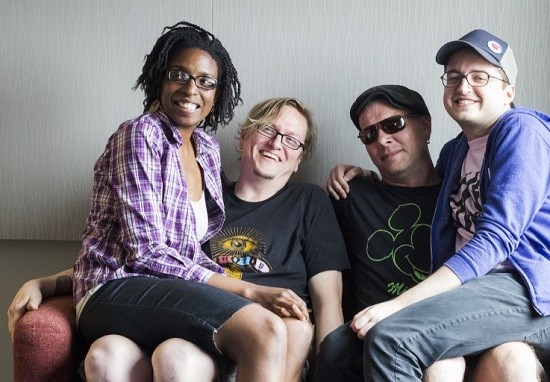Bassist Brian Fleschute and drummer Harold Covey are unsung heroes of St. Louis music. The duo is best known for founding the Pat Sajak Assassins, a local group that features a rotating cast of contributing musicians. And that band might best be thought of as five separate bands -- one to correspond with each new approach it has taken over the years.
"We've had so many different players, we're sort of like chameleons," Covey says. "We latch onto this person who's doing their thing and just go with it. It's a back and forth. When they start contributing, I think it changes what we do." In keeping, Pat Sajak Assassins has as many albums as it does lineup changes -- five in total, including Motherboard, which is set for release this Friday at the Heavy Anchor.
In the broadest sense, PSA is a rock band, but its tendency to stray from straight-ahead rhythm, along with an almost total absence of recurring pieces, places the band in experimental territory. But Fleschute and Covey don't discount the use of melody or even pop structure. In this way, the group works as a gateway to a stranger realm of music while still remaining accessible.
"I would ask new bandmates, 'What's your influences?' and I would write based on that," Fleschute says of the band's amicable approach.
"I think we'd gotten more accessible. The contributors change and the output changes," Covey adds.
Covey and Fleschute formed the first iteration of PSA in 2001 when both players were working with other bands. Early output pulled elements from free-jazz and no-wave, appropriating horn skronk to serve tightly wound songs. Its first album, Soundtracks for Superheroes, was led by songwriter and guitarist Joseph Freeman and dropped in late 2006.
PSA kept good company through the mid-aughts, opening for bands such as Battles, Don Caballero, 90 Day Men and Metric. Inspiration from these and other math-rock contemporaries led to a more complex sound. For its second album, LUNCH?!?, PSA also feels soundtrack-esque thanks to Freeman's work as a multi-instrumentalist, stretching the group's sound considerably.
Musician Matt Derouin played a major role in the band as both second guitar on LUNCH?!? and principle songwriter later on. His work helped bridge the gap between the band's dense ideas and a more song-oriented approach. PSA's third record, Approved by NASA, featured a new focus on vocals and made the band more accessible all around.
"We've never been interested in a narrative at all. We just like the concept of a voice as an instrument," Covey says.
With the addition of current keyboardist Christopher Eilers, the group has morphed once again, moving back to its old prog leanings while retaining vocals on a few key songs. Its fourth effort, Thigh Master, is a short but quality record that brings a refinement of past ideas.
Continue to page two.


